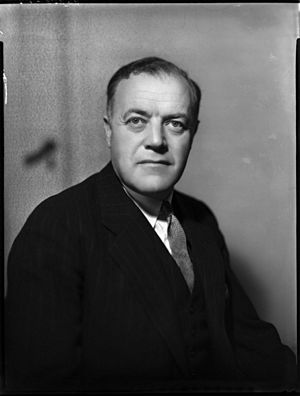Richard Stokes (politician) facts for kids
Quick facts for kids
Richard Stokes
|
|
|---|---|
 |
|
| Minister of Materials | |
| In office 6 July 1951 – 26 October 1951 |
|
| Leader | Clement Attlee |
| Preceded by | Office established |
| Succeeded by | Viscount Swinton |
| Lord Keeper of the Privy Seal | |
| In office 26 April 1951 – 26 October 1951 |
|
| Leader | Clement Attlee |
| Preceded by | Ernest Bevin |
| Succeeded by | The Marquess of Salisbury |
| Minister of Works | |
| In office 28 February 1950 – 26 April 1951 |
|
| Leader | Clement Attlee |
| Preceded by | Charles Key |
| Succeeded by | George Brown |
| Member of Parliament for Ipswich | |
| In office 16 February 1938 – 3 August 1957 |
|
| Preceded by | John Ganzoni |
| Succeeded by | Dingle Foot |
| Personal details | |
| Born |
Richard Rapier Stokes
27 January 1897 |
| Died | 3 August 1957 (aged 60) London, England |
| Nationality | British |
| Political party | Labour |
| Parents | Philip Folliot Stokes Mary Fenwick Rapier |
| Alma mater | Trinity College, Cambridge |
Richard Rapier Stokes (born January 27, 1897 – died August 3, 1957) was a British soldier and a politician. He was a member of the Labour Party. He served as a Member of Parliament (MP) for Ipswich for many years. He also held important government jobs, including Lord Privy Seal in 1951.
Contents
Early Life and Military Service
Richard Stokes was born in 1897. His father was Philip Folliott Stokes. His mother was Mary Fenwick Rapier. He went to Downside School and then to Sandhurst.
During World War I, Richard Stokes served in the Royal Artillery. He was a brave soldier. He received the Military Cross and the Croix de Guerre for his actions. After the war, he continued his education at Trinity College, Cambridge.
Richard had several interesting relatives. His uncle, Sir Wilfred Stokes, invented the Stokes Mortar. This was an important weapon used in World War I. Another uncle, Leonard Stokes, was an architect. He designed new buildings for Downside School.
Business and Politics
After finishing college, Richard Stokes joined his family's business, Ransomes & Rapier. This was an engineering company. He became the managing director when he was 30 years old.
When the British government planned to increase military production, Stokes made a special offer. He said his company would only charge the government what it cost to make the items. This offer was not accepted by the government at the time. He later spoke about this in his first speech in Parliament.
Richard Stokes first tried to become an MP in 1935. He did not win that election. However, in 1938, he won the Ipswich seat in a special election. He continued to be the MP for Ipswich in several elections until his death in 1957. He was known for being very independent in Parliament. This meant he often spoke his own mind, even if it went against his party.
Important Political Stances
Before World War II, Richard Stokes was concerned about peace in Europe. He wrote a paper with other politicians about the economic reasons for conflict. He also started a group called the Parliamentary Peace Aims Group. This group worked to find ways to achieve peace.
During World War II, Stokes spoke out against the area bombing of German cities. He believed it was wrong to bomb large areas, harming many civilians. After the bombing of Dresden in 1945, he questioned the government's bombing policy. His questions helped lead to a review of how bombing was done in the final months of the war.
Stokes also criticized the design of British tanks during the war. He felt they were not good enough. After the war, he raised concerns about other issues. These included the Yalta Conference and the forced return of some people to Yugoslavia.
Government Roles
After the Labour Party won the 1945 general election, Richard Stokes became more involved in government. He spent a lot of time working with the Friends of Ireland group.
In April 1951, he was given two important jobs. He became the Lord Privy Seal and the new Minister of Materials. He took over from Ernest Bevin. He aimed to show that Britain could produce the weapons it needed. However, he only served in these roles for a few months. The Labour Party lost the 1951 general election in October of that year.
After Labour left power, he served as the main spokesperson for defence for a while.
Later Life
Richard Stokes died on August 3, 1957, in London. He passed away from a heart attack at his home. A few days before, he had been in a car accident. His car overturned during a thunderstorm.
 | Anna J. Cooper |
 | Mary McLeod Bethune |
 | Lillie Mae Bradford |

